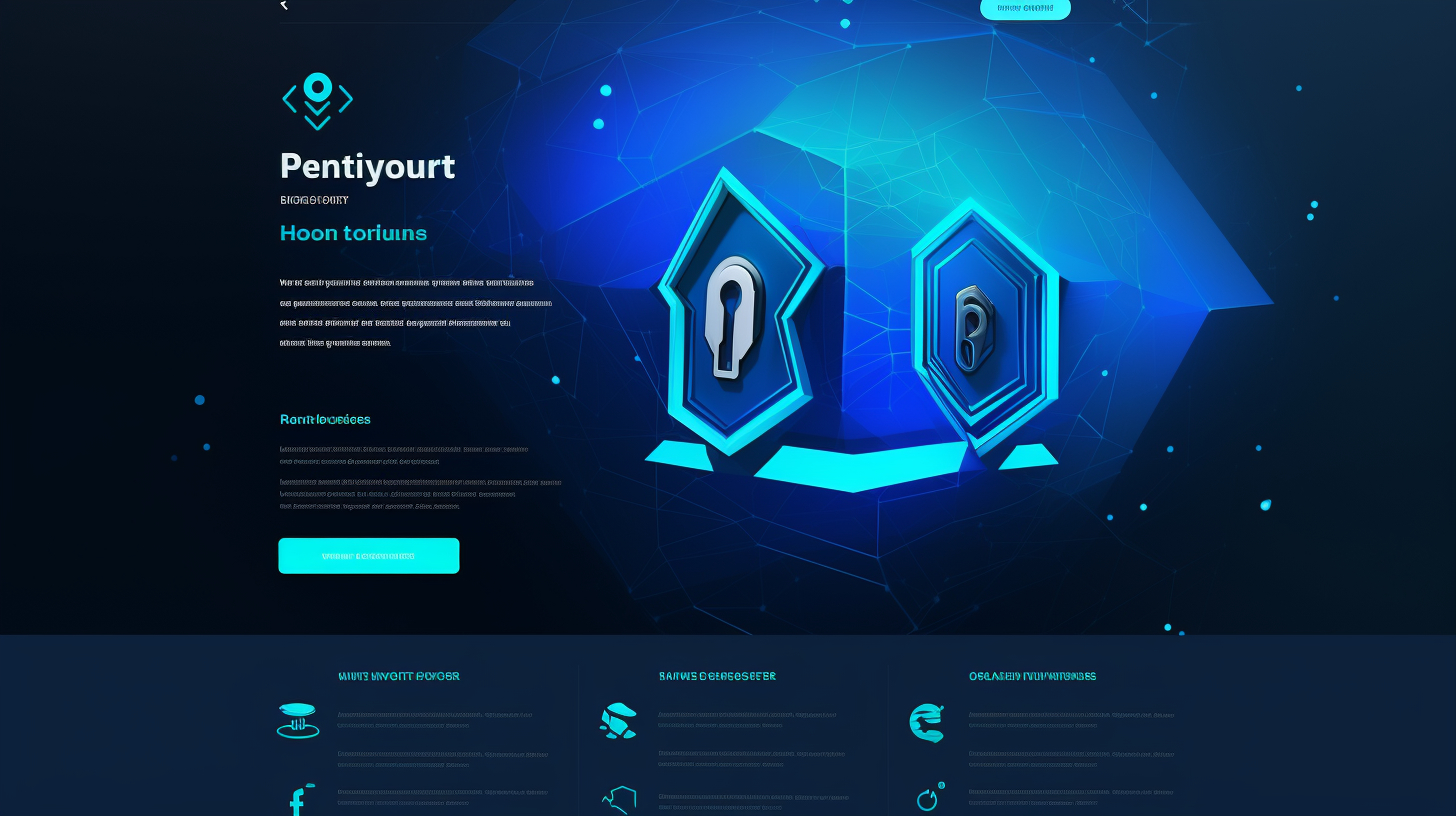Welcome to “Securing Your WordPress Website: Best Practices for IT Managers”. As an IT manager or website owner, you know how important it is to protect your WordPress website from security threats. With the rise in cyber attacks and the increasing popularity of WordPress, it has become essential to implement proper security measures to safeguard your website and its sensitive data.
In this article, we will explore the general security statistics for WordPress, potential vulnerabilities in WordPress, and best practices for WordPress security. By following these best practices, you can significantly reduce the risk of your website being compromised and ensure a safe browsing experience for your users.
So let’s dive in and learn how to secure your WordPress website effectively!
General Security Statistics for WordPress
WordPress is undoubtedly one of the most popular and widely used content management systems (CMS) in the world. However, its popularity also makes it a prime target for malicious attackers. As an IT manager, it is crucial to understand the general security statistics for WordPress to ensure the safety and protection of your website. Let’s dive into some key statistics that highlight the importance of securing your WordPress website:
Attacks targeted towards WordPress
- 81% of attacks on WordPress sites are based on insecure or stolen passwords. This highlights the significance of using strong and unique passwords for your WordPress admin account and all user accounts associated with your website.
Percentage of infected websites
- 74% of infected websites were built on WordPress. This demonstrates that WordPress websites are commonly targeted by hackers due to their vulnerabilities and widespread usage.
Role of weak passwords
- 4.3% of WordPress websites scanned with SiteCheck in 2022 had been hacked. Weak passwords are one of the leading causes of website vulnerabilities. It is crucial to educate your users about the importance of strong passwords and implement password policies to enforce their usage.
WordPress’s share on the internet
- 39.3% of hacked WordPress sites were running out-of-date WordPress core software. Keeping your WordPress installation up to date is crucial as outdated software can expose your website to known vulnerabilities. Regularly updating your WordPress core, themes, and plugins is vital for maintaining a secure website.
Role of outdated WordPress core software
- 90,000 attacks per minute are targeted towards WordPress websites. The sheer number of attacks emphasizes the importance of implementing robust security measures to protect your WordPress website from potential threats.
Understanding these statistics is the first step towards securing your WordPress website. By being aware of the vulnerabilities and risks associated with WordPress, you can implement the necessary security measures to safeguard your website and sensitive information. In the next section, we will explore the potential vulnerabilities in WordPress and how to address them effectively.
Potential Vulnerabilities in WordPress
WordPress, being one of the most popular content management systems (CMS) in the world, is often targeted by hackers and malicious actors. It’s important for IT managers and website owners to be aware of the potential vulnerabilities in WordPress in order to strengthen the security of their websites.
Here are some key vulnerabilities to be mindful of:
Role of WordPress Plugins
- 52% of reported vulnerabilities were caused by WordPress plugins. Plugins are the backbone of WordPress, providing additional functionality and features. However, not all plugins are created equal, and some may have security flaws that can be exploited by hackers.
- When choosing plugins, make sure to select reputable ones that are regularly updated and have a good track record for security. It’s also advisable to keep the number of plugins to a minimum to reduce the risk of vulnerabilities.
Role of WordPress Themes
- Approximately 97% of vulnerabilities in the WPScan database are plugins and themes. Themes control the design and layout of your WordPress site. Like plugins, themes can also have security vulnerabilities that can be exploited.
- It’s important to choose themes from trusted sources and keep them updated. Avoid using pirated or nulled themes, as they often contain hidden malicious code.
Storage of Sensitive User Information
- WordPress stores user information, such as passwords and email addresses, in its database. If this information falls into the wrong hands, it can lead to serious security breaches.
- It’s crucial to protect the WordPress database by regularly backing it up, encrypting sensitive information, and implementing strong access controls.
While these vulnerabilities exist, it’s important to note that WordPress constantly releases security updates to address these issues. However, it’s the responsibility of website owners and IT managers to stay vigilant and take proactive measures to secure their WordPress sites.
“WordPress plugins are responsible for 90% of security exploits.” – WPSecurity
In the next section, we will discuss best practices for securing WordPress websites, which will help IT managers and website owners protect their sites from potential threats. So, let’s dive in!
Best Practices for WordPress Security
WordPress is one of the most popular Content Management Systems (CMS) in the world. According to recent statistics, it powers over 40% of all websites on the internet[1]. However, its popularity also makes it a prime target for hackers and attackers. As an IT manager, it is crucial to take proactive measures to secure your WordPress website and protect it from potential vulnerabilities and threats. In this article, we will discuss the best practices for WordPress security that you can implement to keep your website safe.
Use of strong usernames and passwords
The first line of defense for any website is a strong username and password combination. By using weak credentials, you are leaving your website vulnerable to brute force attacks. Ensure that you and your team use unique and complex usernames and passwords that are not easily guessable. You can also consider implementing two-factor authentication for an added layer of security.
Regular updates
Keeping your WordPress core software, themes, and plugins up to date is crucial for website security. Developers often release updates to patch security vulnerabilities and improve overall functionality. Neglecting updates could expose your website to potential attacks. Make it a regular practice to check for updates and apply them as soon as they are available.
Role of web hosts
The choice of web hosting provider plays a significant role in the security of your WordPress website. Opting for a reputable web host that specializes in WordPress hosting can provide added security measures such as malware scanning, firewalls, and regular backups. Ensure that your web host has a strong track record of security and offers secure protocols such as SSL for data encryption.
Changing file and directory permissions
File and directory permissions determine who can access and modify the files on your server. Incorrect permissions can result in unauthorized access and potential security breaches. It is crucial to set the correct file and directory permissions for your WordPress installation to ensure that only the necessary files are accessible and writable.
Protection of passwords in WordPress database
The passwords stored in your WordPress database should be properly protected. By default, WordPress uses a technique known as hashing to encrypt user passwords. However, it is vital to use strong hashing algorithms and salts to enhance password security. Additionally, consider implementing measures to protect your database from unauthorized access, such as restricting access to the database server and regularly backing up your database.
Use of SSL certificates and firewalls
Implementing SSL certificates is essential for securing data transmission between your website and its visitors. SSL ensures that the information exchanged is encrypted and cannot be intercepted by attackers. Additionally, consider implementing firewalls to add an extra layer of protection against malicious traffic and potential attacks.
Website backups and limiting login attempts
Regularly backing up your website is a fundamental technique for securing WordPress websites. In the event of a security breach or data loss, having a recent and reliable backup can significantly reduce downtime and ensure quick recovery. Additionally, consider limiting the number of login attempts to prevent brute force attacks. Several WordPress security plugins offer this functionality, allowing you to set a specific number of login attempts before locking out the user.
Use of reputable security plugins and scanners
WordPress security plugins provide additional layers of protection to your website. They can help detect and prevent malicious activities, such as malware injections, brute force attacks, and unauthorized access attempts. Look for reputable security plugins that offer features such as real-time scanning, firewall protection, and vulnerability assessments.
Implementing website lockdown features
Implementing website lockdown features can be an effective strategy to protect your WordPress website. By implementing measures such as renaming the login URL, restricting access to certain IP addresses, and enabling IP whitelisting, you can limit access to your website and reduce the likelihood of unauthorized login attempts.
By following these best practices for WordPress security, you can significantly enhance the protection of your website against potential vulnerabilities and attacks. Remember, securing your WordPress website is an ongoing process, and it requires regular updates, strong passwords, and proactive measures to ensure a safe online presence.
“WordPress security is not just plugin installations; it is a mindset, action, and ongoing management.”
– Sucuri
Stay informed about the latest security updates, trends, and best practices to stay one step ahead of potential threats. By investing in the security of your WordPress website, you are safeguarding your business reputation, customer trust, and valuable online assets.
[1] – Source: link
Conclusion
In conclusion, securing your WordPress website is essential to protect your valuable data and ensure a safe online presence. By implementing best practices and staying vigilant, you can significantly reduce the risk of security breaches and attacks. Here are the key takeaways:
- Use strong usernames and passwords: Avoid common or easily guessable credentials to prevent unauthorized access.
- Regularly update WordPress, themes, and plugins: Keep your website up to date to stay protected against known vulnerabilities.
- Choose a reliable web host: Selecting a reputable hosting provider can ensure robust security measures and reliable support.
- Change file and directory permissions: Restrict access to sensitive files and folders to prevent tampering or unauthorized modifications.
- Protect passwords in the WordPress database: Employ encryption techniques to secure stored passwords and enhance overall website security.
- Implement SSL certificates and firewalls: Enable SSL certificates to encrypt communication and install firewalls to filter and block malicious traffic.
- Backup your website and limit login attempts: Regularly backup your website to mitigate the impact of any unforeseen events, and limit login attempts to thwart brute force attacks.
- Use reputable security plugins and scanners: Install trusted security plugins and scanners to proactively identify and address potential vulnerabilities.
- Implement website lockdown features: Implement features like renaming the login URL and activating website lockdown modes to add an extra layer of security.
Remember, securing your WordPress website is an ongoing process. Stay informed about the latest security practices and keep up with updates to ensure your website remains protected. If you’re looking for a premium managed WordPress cloud hosting platform that simplifies infrastructure and provides expert support, consider Managed-WP. With their 24/7/365 problem-solving approach, they can help safeguard your WordPress website and provide a seamless digital experience.
Boost your website security and explore the features of Managed-WP’s premium managed WordPress cloud hosting platform here.
Frequently Asked Questions
- Why is securing a WordPress website important?
Securing a WordPress website is important to protect sensitive data, prevent unauthorized access or hacking attempts, maintain website functionality, and preserve the reputation of your business or organization.
- What are some best practices to secure a WordPress website?
Some best practices to secure a WordPress website include: (1) Keeping WordPress and plugins updated, (2) using strong and unique passwords, (3) enabling two-factor authentication, (4) using a reliable web hosting provider, (5) installing security plugins, and (6) regularly backing up the website.
- How can I protect against brute force attacks?
To protect against brute force attacks, you can implement measures such as limiting login attempts, using CAPTCHA, implementing two-factor authentication, and considering a web application firewall.
- What is the role of SSL certificates in website security?
SSL certificates play a crucial role in website security by encrypting the data exchanged between the web server and the user’s browser. This encryption ensures that sensitive information transmitted, such as login credentials or payment details, remains secure and cannot be intercepted by malicious actors.
- What should I do if my WordPress website gets hacked?
If your WordPress website gets hacked, you should take immediate action by isolating the infected website, removing malware or suspicious code, updating all themes and plugins, resetting passwords, and conducting a thorough security audit to identify and fix any vulnerabilities.
{“@context”: “https://schema.org”,”@type”: “FAQPage”, “mainEntity”: [
{“@type”: “Question”,”name”: “Why is securing a WordPress website important?”,”acceptedAnswer”: { “@type”: “Answer”,”text”: “Securing a WordPress website is important to protect sensitive data, prevent unauthorized access or hacking attempts, maintain website functionality, and preserve the reputation of your business or organization.”}},
{“@type”: “Question”,”name”: “What are some best practices to secure a WordPress website?”,”acceptedAnswer”: { “@type”: “Answer”,”text”: “Some best practices to secure a WordPress website include: (1) Keeping WordPress and plugins updated, (2) using strong and unique passwords, (3) enabling two-factor authentication, (4) using a reliable web hosting provider, (5) installing security plugins, and (6) regularly backing up the website.”}},
{“@type”: “Question”,”name”: “How can I protect against brute force attacks?”,”acceptedAnswer”: { “@type”: “Answer”,”text”: “To protect against brute force attacks, you can implement measures such as limiting login attempts, using CAPTCHA, implementing two-factor authentication, and considering a web application firewall.”}},
{“@type”: “Question”,”name”: “What is the role of SSL certificates in website security?”,”acceptedAnswer”: { “@type”: “Answer”,”text”: “SSL certificates play a crucial role in website security by encrypting the data exchanged between the web server and the user’s browser. This encryption ensures that sensitive information transmitted, such as login credentials or payment details, remains secure and cannot be intercepted by malicious actors.”}},
{“@type”: “Question”,”name”: “What should I do if my WordPress website gets hacked?”,”acceptedAnswer”: { “@type”: “Answer”,”text”: “If your WordPress website gets hacked, you should take immediate action by isolating the infected website, removing malware or suspicious code, updating all themes and plugins, resetting passwords, and conducting a thorough security audit to identify and fix any vulnerabilities.”}}
]}



















